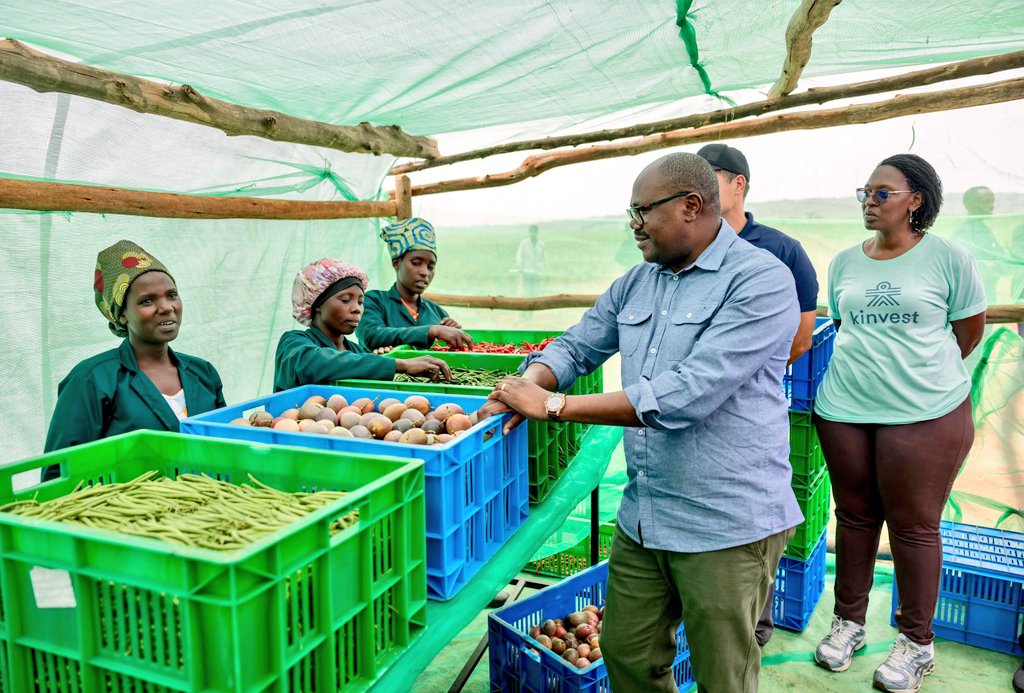Rwanda’s agricultural sector has received a major boost as the Government of Rwanda and the African Development Bank Group (AfDB) move forward with plans for the second phase of the Gabiro Agribusiness Hub project. The development was confirmed on August 12, when the Minister of Agriculture and Animal Resources, Mark Cyubahiro Bagabe, and AfDB Group Rwanda Country Manager, Aissa Touré Sarr, signed an aide mémoire to kickstart a feasibility study. The ceremony marked a key step in expanding the hub’s coverage to 10,000 hectares, almost double the size of the first phase.
The agreement will see AfDB provide a $995,000 grant to support the feasibility study, environmental and social assessments, and other preparations for Phase II. According to the Ministry of Agriculture and Animal Resources, this study will also look into setting up a special agro-industrial processing zone, cold storage facilities, aggregation centres, and other infrastructure aimed at helping smallholder farmers improve productivity.
Aissa Touré Sarr, while sharing the news on her official X page, explained that the grant will also support the Kivu Cold Group – a joint venture between companies in Rwanda and Japan. The group is working on building a sustainable cold chain powered by eco-friendly off-grid electricity, with the goal of making agriculture in sub-Saharan Africa more climate resilient. By providing storage and reducing waste, the project will also tackle the challenge of post-harvest losses, which have been a concern for farmers.
For Aloysius Ngarambe, CEO of Gabiro Agribusiness Hub Ltd – the company managing the project – the feasibility study is not just about planning but also about attracting investors. He noted that the results of the study will help determine the financial requirements for the second phase and serve as a tool for securing funding.
The Gabiro Agribusiness Hub is one of Rwanda’s flagship agricultural projects, covering 15,600 hectares in total. Its first phase, located in Nyagatare District, spans 5,600 hectares and already has irrigation infrastructure in place. The Rwandan government invested about $118 million (around Rwf170 billion) in its development. According to Ngarambe, Phase I is now 98% complete and will be officially commissioned soon, with the Israeli company Netafim expected to hand over the project in September.
Phase II will add another 10,000 hectares, stretching into both Nyagatare and Gatsibo districts in Rwanda’s Eastern Province. The award of the feasibility study contract is expected within the next three months, although the exact timeline for completing the study is still uncertain. Minister Bagabe has stated that once the study is concluded, the government will move straight into implementation.
The hub is being hailed as Rwanda’s first large-scale, job-creating farming model, designed to increase food production, boost agricultural exports, and improve farmers’ incomes. Seven agribusiness companies are already operating within the first phase of the hub, producing crops such as maize, soybeans, fruits, and vegetables. With modern irrigation systems in place, farmers can grow crops all year round, even in drought-prone areas of Nyagatare.
Land within the hub has been leased to private investors for commercial farming, and some companies are already producing for both the local and export markets. The Private Sector Development and Youth Employment Sector Strategic Plan 2024–2029 projects that Phase II will attract about $100 million (around Rwf145 billion) in investment. The Rwandan government sees this as a vital move to attract large-scale private investment in agriculture and agro-processing.
Officials believe that the expansion of the Gabiro Agribusiness Hub will not only create thousands of jobs but also reduce trade imbalances by increasing agricultural exports. It is also expected to strengthen Rwanda’s position as a regional hub for agro-industrial growth. With the AfDB’s support and the government’s commitment, the second phase of this project could become a game-changer for the country’s agricultural transformation.
